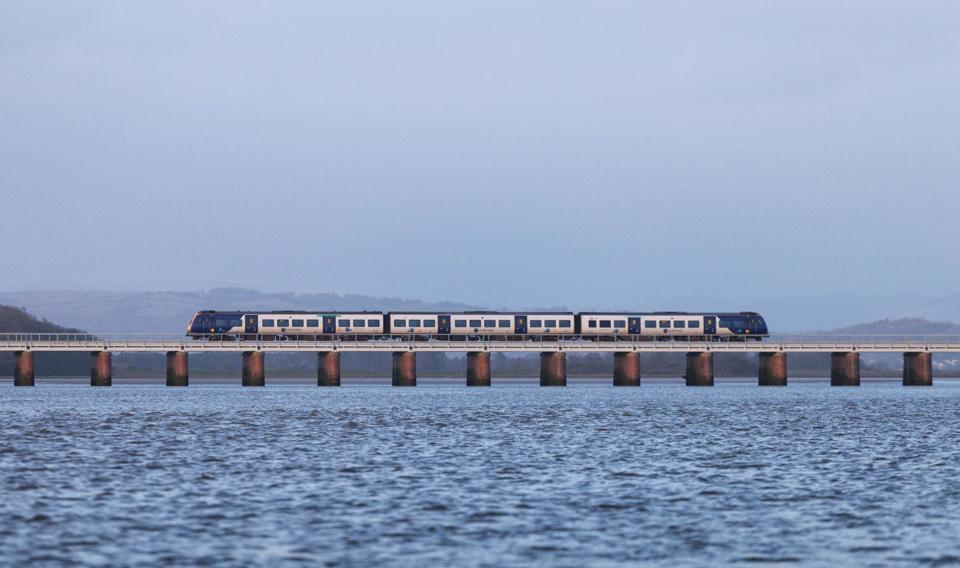Two of Britain’s train operating companies are living on borrowed time.
Greater Anglia and West Midlands Trains have contracts that contain core term expiry dates of September 15 2024. To bring them into the public sector, Labour Transport Secretary Louise Haigh need only serve an expiry notice that gives at least three reporting periods’ warning. Each reporting period is 28 days, so that makes 84 days.
Two of Britain’s train operating companies are living on borrowed time.
Greater Anglia and West Midlands Trains have contracts that contain core term expiry dates of September 15 2024. To bring them into the public sector, Labour Transport Secretary Louise Haigh need only serve an expiry notice that gives at least three reporting periods’ warning. Each reporting period is 28 days, so that makes 84 days.
Such an expiry notice cannot take effect before the core term expiry date. But as we are now within 84 days of September 15, the Transport Secretary can trigger the end of private operations for those two companies whenever she pleases.
Yet nationalising train operators is not a silver bullet, as the Office of Rail and Road (ORR) has shown with its cancellation statistics, published just after July 4’s General Election.
The statistics relate to those infamous p-cancellations, where trains disappear from the timetable at short notice, usually because of lack of crews or rolling stock.
Seven operators feature in ORR’s latest figures, which cover May 26-June 22. Four of the seven are nationalised - LNER, Northern, TransPennine Express and ScotRail. The others are c2c, Grand Central (a private open access operator) and West Midlands Trains.
The nationalised operators partially or fully pre-cancelled 2,974 services (with Northern fully pre-cancelling 2,542 services for lack of crews), while the other three operators’ figure came to 68 (c2c contributing the greater part of that number, with 40 full cancellations for lack of crews).
Much-maligned Avanti West Coast didn’t feature on ORR’s pre-cancellation figures, and is reporting a cancellation rate of 4.6% for the May-June Period 3 (up on the 2.2% of Period 2 and 2.3% in Period 1).
When AWC includes cancellations beyond its control, the Period 3 figure rises to 10.2%. For contrast, LNER reports an equivalent rate of 4.4%, but that’s a figure ORR adjusts upwards to 6.7% to take account of pre-cancellations.
AWC has been on the receiving end of many calls for it to be stripped of its contract, particularly from politicians in northern England. Unless it defaults on its contract, it has a core term expiry date of October 10 2025 and needs the usual three reporting periods notice from the Transport Secretary.
To a great extent, the arguments about public and private are political, made by politicians to score points from each other. They generate more heat than light and have little relevance to railway staff trying to deliver a better service every day.
Those staff show their allegiance to the railway. Many (most?) don’t really care for their owning group. They want to do a good job, but have come through some trying years which have sapped morale.
I should include senior managers in that statement. They too want to deliver a good railway, irrespective of which entity owns the company they work for.
So, we have a direction of travel which will, over time, shift those operators working to Department for Transport contracts to sit directly under the DfT’s ownership.
But in the meantime, the directors and staff of those operators will be keen to increase passenger numbers, improve performance, and boost revenue.
Which is what the new government wants, too. This means that DfT ministers should not obsess about rapid nationalisation, but should instead give their contracted operators the freedom to deliver those ridership, performance and revenue priorities.
The train operators have shown themselves capable of delivering these things in the past. They can do so again.
But I do sense one difference. Older hands suggest that previous prescriptions may no longer be as effective as they once were. Where once passenger numbers naturally rose with improving performance, they suspect this is no longer the case.
Rail needs to work much harder to win passengers. It needs better marketing - not just for leisure travellers, but also to convince people that a daily trip to the office is worthwhile - but also a better offer.
Some operators are better at this than others. For example, LNER knows its First Class market well and its off-peak trains are busy with FC passengers who seem to me mostly retired. Meanwhile, Avanti West Coast has gone for a three-tier offer which inserts an intermediate class between Standard and First, offering a more comfortable seat but without the service attached to full First Class fares.
Irrespective of where you pay to sit on a train, rail needs to be more attractive. It should compete on price, and it should compete on service.
This means all sorts of things: lifts that work at stations, sufficient space on trains for luggage (and knees come to that), and fares that are fair.
Rail needs to be good in its own right, not just better than the alternatives. As one insider said to me recently: “We can’t rely on the roads being bad.”
And bad they are. I’ll admit that my last long-distance journey was by road - York to Gloucester and back. The M1 seemed to be continuous roadworks and my return along the M5 on a Friday afternoon was snarled all the way to Birmingham.
The result was a return leg that took an hour longer than my sat-nav initially predicted. At least by rail, Delay Repay would have kicked in!
To better attract passengers, rail needs some investment - partially to restore standards that were slowly being chipped away even before 2020’s pandemic struck.
Here, DfT could usefully shift business planning for train operators beyond the annual cycle that has been in place since COVID. Switching to at least three years would be a good start, allowing rail companies (whether directly owned by DfT or not) to plan with greater clarity and embark on initiatives that don’t demand payback within the year.
The other area that remains beyond easy reach from train operators is pay and industrial relations. Many of those pre-cancellations mentioned earlier come from staff not volunteering to work overtime, especially for those whose contracts leave Sundays optional.
A deal should now be easier - but not necessarily easy. Easier because I’m sure that drivers’ union ASLEF was never going to give a Conservative government a win. But not easy because there are some fundamental costs involved.
They are not just the pay deals that ASLEF has been chasing, but the matter of overtime.
In the past, overtime has been a useful compromise. Some individual drivers welcome the ability to earn extra, while managers liked it because it kept overall staff numbers lower than they might be otherwise.
Unions such as ASLEF have never really liked it, but have had to recognise that many of their members did. ASLEF would much rather see more drivers employed.
There’s a business aspect to this. For ASLEF, more drivers means more members means more income. Like any business, ASLEF has bills and salaries to pay, but knows it can’t just increase subscriptions, so it argues for more drivers.
This will increase train operators’ costs, putting pressure on ministers to increase taxpayer support or put fares up. And when they have control of today’s private operators, the matter of fares will land fully on their desks. They will no longer be able to blame private operators.
Or ministers could see solving the Sunday overtime problem as an essential foundation on which to build a reliable service that can attract more passengers over the years that follow. It could also cut those Delay Repay refunds in the shorter term.
Finally, there was some irony that the first big story to break since Louise Haigh became the self-styled ‘passenger-in-chief’ concerned freight - specifically, the Royal Mail’s withdrawal from rail.
Haulier DB Cargo said the withdrawal was “purely down to increasing costs of electric traction and the high investment needs of its ageing 325 fleet”. Royal Mail owns these 16 four-car Class 325s that it had built in 1995.
By contrast, Royal Mail only mentioned its ageing fleet when I asked why it was withdrawing from rail. It told me: “Royal Mail will continue to use rail services to transport mail across the country. However, our own freight trains are at the end of their operational lives.”
I look forward to hearing that Royal Mail has signed a deal with an alternative rail haulier, but remain rather sceptical about its commitment to rail. Not least because it also told me that switching to road would create 30 full-time driving jobs. And I get the feeling that it’s rather proud of this claim.
What is clear is that whether it’s passenger or freight, no one owes the railway a living. It needs to fight for customers.
Login to continue reading
Or register with RAIL to keep up-to-date with the latest news, insight and opinion.



















Login to comment
Comments
No comments have been made yet.